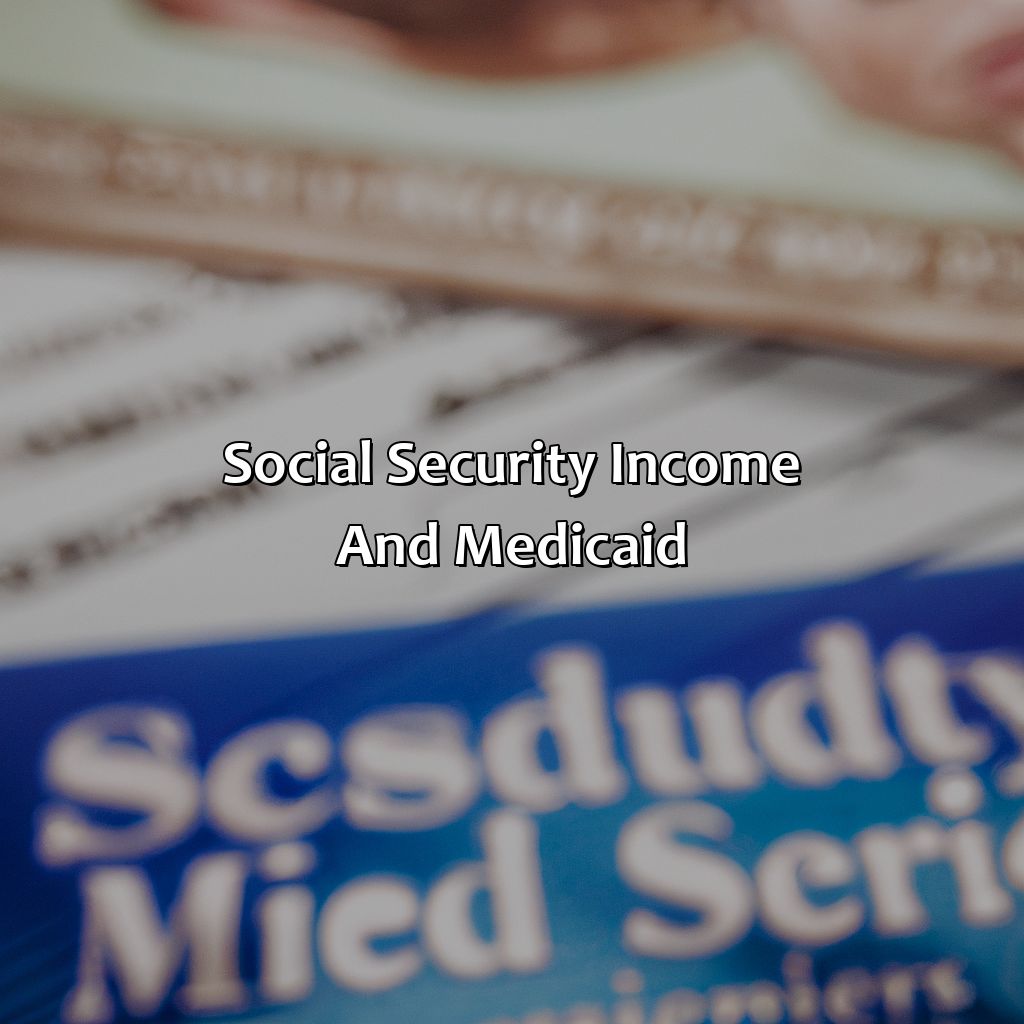What Happens To Your Social Security Check When You Go On Medicaid?
Key Takeaway:
- Medicaid can affect your Social Security benefits: If you are receiving Social Security income and become eligible for Medicaid, your benefits may be affected. This is because Medicaid counts your Social Security income as part of your total income, which can impact your eligibility and the amount of benefits you receive.
- Medicaid has income and asset limits: To be eligible for Medicaid, you must meet certain income and asset limits. If your income or assets exceed these limits, you may not be eligible for Medicaid, which can impact your ability to receive certain health care benefits.
- Strategies to maximize Social Security income while on Medicaid include spend down, qualified income trusts (QITs), and gifting. These strategies can help you stay eligible for Medicaid while still receiving the maximum amount of Social Security benefits possible.
You deserve to know where your social security check goes and what to expect when you go on Medicaid. Struggling to make ends meet? Learn how your social security check will be affected when you qualify for Medicaid.
Social Security Income and Medicaid
Social Security and Medicaid are two critical components of the American social welfare system. Medicaid is a government-funded healthcare program designed to provide healthcare coverage and related services to low-income individuals and families. At the same time, Social Security is a government-run social insurance program that provides monetary benefits to eligible individuals who have retired, become disabled or lost loved ones.
When a person is receiving Social Security Income and then becomes eligible for Medicaid, the process can be complex. Depending on the state, some or all of an individual’s Social Security Income may still be available to them, while other states require some or all of their Social Security Income to be used to cover their medical bills. It is important for individuals to understand how Social Security and Medicaid work together to understand how their benefits may be impacted.
One unique detail to consider is that Social Security benefits are protected by law and cannot be counted as income for Medicaid eligibility purposes. Therefore, individuals with limited resources may still qualify for Medicaid despite receiving Social Security Income.
It is also essential to consider the history of Medicaid and Social Security. Both were amendments to the Social Security Act, aimed at addressing poverty, unemployment, and the lack of healthcare coverage. Medicaid was established in 1965, while Social Security has been in effect since the 1930s. These programs have evolved to support millions of Americans each year, and they continue to provide essential services to vulnerable populations across the United States.

Image credits: retiregenz.com by Yuval Duncun
How Medicaid Affects Social Security Benefits
Do you wonder what happens to your Social Security check when you go on Medicaid? Three key areas affect it. The 5-Year Lookback Period, Income Limits, and Asset Limits are the sub-sections of Medicaid. To clarify, let’s discuss each one in detail.

Image credits: retiregenz.com by Adam Jones
Medicaid and the 5-Year Lookback Period
If you plan on going on Medicaid, it’s important to understand its impact on your Social Security benefits. Specifically, Medicaid has a 5-year lookback period where they review any gifts or asset transfers made within the past five years. If any are found, there may be a penalty period where you’re denied Medicaid coverage.
During this lookback period, Medicaid analyses everything in your financial history including trusts, properties and assets transferred to others. Any money or property gifted during the five-year timeframe can lead to a penalty period which could put you at risk of being denied coverage.
It’s essential to keep in mind that any gifts outside of this 5-year window will not affect your Medicaid eligibility. It is best to consult an attorney familiar with elder law before making any decisions regarding gift transfers while considering applying for Medicaid assistance.
According to Forbes, “If you receive monthly Social Security benefits and have Part B premiums withheld from your checks because you’re enrolled in Medicare medical insurance, any increase in your Part B premium may reduce your Social Security benefit.”
Medicaid’s income limits make you question if being broke is a financial strategy.
Medicaid and Income Limits
When considering Medicaid eligibility, it’s essential to understand how the program’s income limits affect you. Here’s what you need to know regarding Medicaid and Income Limits:
| Program | Income Limit (Annually) |
|---|---|
| Qualified | $0-$12,880 |
| Medicare Savings | $1,083-$1,296 |
| Extra Help | $19,320 (single) $26,130 (married) |
The table above outlines the income limits for various Medicaid programs. “Qualified” refers to general Medicaid coverage where individuals can have an annual income of up to $12,880. For those that qualify for “Medicare savings,” such as the Qualified Medicare Beneficiary (QMB) program or Specified Low-Income Medicare Beneficiary (SLMB) program, income thresholds are slightly higher but still restricted. Lastly, “Extra Help” is limited to low-income beneficiaries with a maximum annual income of up to $19k for singles or $26k for married couples.
It’s important to remember that any additional income you receive beyond the allowed threshold counts towards your overall limit. If your total monthly countable income exceeds this amount, it could jeopardize your partnership with Medicaid and trigger a reduction in benefits. To avoid penalties and protect yourself from losing benefits altogether after enrolling in Medicaid, some strategies may include:
- Working fewer hours or taking lower-paying work.
- Investing money into specialized trusts or spend-down plans.
- Transferring assets over to a spouse or family member who doesn’t live in the same household.
- Utilizing tax-exempt strategies like annuities or life insurance policies.
These suggestions mostly revolve around reducing one’s adjusted gross income levels so that they’re within Medicaid’s accepted range. Therefore by following them extensively and correctly planned out strategies will only make sure that one passes the income threshold to make sure continued coverage under Medicaid.
Looks like Medicaid wants us to be broke and sick, because they sure do have strict asset limits.
Medicaid and Asset Limits
When it comes to Medicaid, there are asset limits in place that can affect an individual’s Social Security benefits. If one decides to go on Medicaid, their assets may be subject to a maximum limit in order to qualify for the program. This limit varies depending on the state and the type of coverage being sought.
It is important to note that not all assets are counted towards the limit. For example, certain types of property such as a primary residence or personal belongings may be exempt. However, any excess assets will likely need to be spent down before becoming eligible for Medicaid.
In addition to impacting eligibility for Medicaid, these asset limits can also affect Social Security benefits. If an individual is receiving both Medicaid and Social Security benefits, their monthly payment may be reduced if they exceed the asset limit set forth by Medicaid.
It is crucial for individuals who are considering going on Medicaid or have already done so to understand how their assets may impact their eligibility and Social Security benefits. It is recommended that they consult with a financial advisor or elder law attorney to better navigate this complex topic.
A true history worth noting is that in 2020, more than 70 million people were enrolled in Medicaid across the United States. With constantly changing regulations and policies surrounding this program and its impact on other benefits, staying informed remains critical for those who rely on its assistance.
Maximizing your social security income while on Medicaid is like trying to juggle chainsaws while riding a unicycle through a minefield.
Strategies to Maximize Social Security Income while on Medicaid
Maximize your social security income when on Medicaid! Try strategies such as Spend Down, Qualified Income Trusts (QITs), and Gifting. These methods can help you get the most out of your social security benefits. Even while on Medicaid, you can still get the most out of your social security income!

Image credits: retiregenz.com by Joel Duncun
Spend Down
To decrease financial responsibility, eligible people can follow the spend-down process. It involves utilizing excess income to pay medical bills. This process brings down the income level within the qualification limit for Medicaid eligibility.
One must provide proof of medicaid-attendant medical costs monthly to continue receiving benefits.
Also, during spend-downs, individuals often want guidance to utilize their excess money with minimum impact on Social Security income or other benefits. Preplan and consult with social security experts before starting this process.
Always consider spending money on necessary home repairs such as remodeling your residence bathroom or widening doorways so that an individual can comfortably move around in the house can qualify expenses admissible under the Medicaid program.
Pro Tip – Do not wait too long to initiate spend-down if you have financial assets above Medicaid’s eligibility cap since unpaid medical bills accrued outside Medicaid oversight cannot factor into a successful spend-down strategy later down the line.
The only thing scarier than having to navigate Medicaid and Social Security is realizing you need a Qualified Income Trust (QIT) to do it.
Qualified Income Trusts (QITs)
When a person goes on Medicaid, their income may affect their eligibility. A potential solution is to use an income trust, also known as a ‘Miller Trust,’ which is a legal tool designed to address this issue. The state deems the person’s income as unable to pay for the long-term care costs, and thus they become eligible for Medicaid.
An Income trust formation requires that all of the Social Security payment be placed into it and used in precise ways. These Qualified Income Trusts (QITs) must follow several distinct policies, including having a specific Trustee who manages its funds appropriately.
Individuals who plan to go on Medicaid should consider setting up a qualified income trust before they do so. Failure to set up this type of trust could mean losing access to one’s Social Security benefits when switching onto Medicaid.
A word of caution – it is essential to consult with an experienced professional before establishing a QIT, as there are several rules and regulations regarding its operation. An attorney with experience in elder law or estate planning can provide trustworthy advice tailored to your specific circumstances. Finally, think about hiring an attorney who has experience in drafting QITs when creating one in case many different issues present themselves.
Gifting during the holidays can be tricky, but gifting to your heirs while on Medicaid can be downright diabolical.
Gifting
Giving Away Assets
A key strategy to maximize Social Security income while on Medicaid is through the act of giving away assets. Although there are strict eligibility requirements, gifting assets can be done in a planned and legal manner.
- Gifting can be done through direct gifts to family members or transfers into trust accounts.
- Gifts must be made at fair market value, not undervalued or falsely appraised.
- Gifts made within the lookback period of five years prior to Medicaid application can result in a penalty period where benefits are temporarily reduced or denied.
- An estate planning attorney should be consulted before making any gifts to ensure compliance with Medicaid laws and regulations.
- In addition to Social Security income, gifted assets may also provide tax benefits for both the giver and receiver.
It is important to note that gifting assets is just one strategy among many to maximize Social Security income while on Medicaid. Other strategies include setting up special needs trusts and purchasing annuities.
When considering gifting as a strategy, it is crucial to work with an experienced professional who understands the intricacies of Medicaid regulations.
For example, John gifted his house to his daughter five years before he applied for Medicaid. However, because the gift was not properly valued at fair market price, it resulted in a penalty period where John’s benefits were temporarily denied. It could have been prevented by seeking legal advice beforehand.
Some Facts About What Happens to Your Social Security Check When You Go on Medicaid:
- ✅ When you go on Medicaid, your Social Security check may be offset to cover the cost of your long-term care. (Source: AARP)
- ✅ Medicaid may only count part of your Social Security income when determining eligibility for benefits. (Source: ElderLawAnswers)
- ✅ If you receive both Social Security and SSI, your SSI benefit may be reduced or eliminated when you go on Medicaid. (Source: Social Security Administration)
- ✅ Medicaid may place a lien on your home or other assets to recover the cost of your care. (Source: National Council on Aging)
- ✅ It’s important to work with a knowledgeable elder law attorney or financial planner to understand how going on Medicaid may impact your Social Security benefits. (Source: A Place for Mom)
FAQs about What Happens To Your Social Security Check When You Go On Medicaid?
What happens to your social security check when you go on Medicaid?
When you go on Medicaid, your social security check will still be deposited into your account as usual. However, you may be required to use some or all of the money from your social security check to pay for your medical expenses, depending on your income and the state you live in.
Will my social security benefits be reduced when I go on Medicaid?
No, your social security benefits will not be reduced when you go on Medicaid. However, you may be required to use some of your benefits to pay for healthcare expenses.
Do I have to apply for Medicaid to receive help with my medical expenses?
Yes, you must apply for Medicaid to receive help with your medical expenses if you meet the income and eligibility requirements. Your social security benefits may be taken into consideration when determining your eligibility for Medicaid.
What other benefits can I receive when I am on Medicaid?
When you are on Medicaid, you may be eligible for other benefits such as prescription drug coverage, dental and vision care, and transportation assistance to appointments.
Can I still work while receiving Medicaid benefits?
Yes, you can still work while receiving Medicaid benefits. However, your income may affect your eligibility for Medicaid and the amount of assistance you receive. It is important to report any changes in income to your Medicaid office.
What happens if I no longer need Medicaid assistance?
If you no longer need Medicaid assistance, you can inform your Medicaid office and your coverage will be terminated. You may also be eligible for other healthcare options such as Medicare or private insurance.
